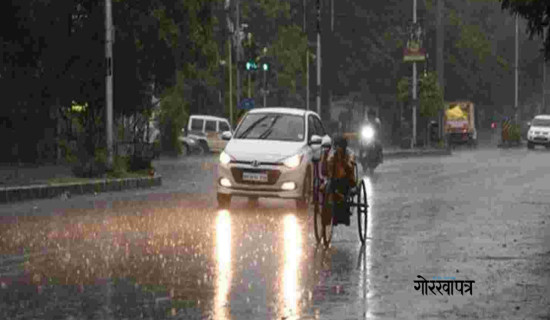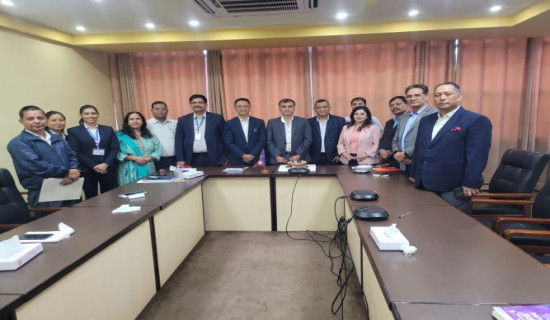- Tuesday, 22 July 2025
Five organisations agree for construction of power projects, transmission line in West Seti Corridor
By A Staff Reporter,Kathmandu, July 22: A multilateral Memorandum of Understanding (MoU) has been signed for hydropower development and the construction of a 400 kV transmission line in the West Seti Corridor.
The MoU was signed among five institutions—Hydroelectricity Investment and Development Company Limited (HIDCL), Rastriya Prasharan Grid Company Limited (RPGCL), Chainpur Seti Jalbidhyut Company Limited (CSJCL), Chilime Seti Hydropower Company Limited (CSHC) and Samriddhi Engineering Limited (SEL)—with the aim of collaborating in the construction of hydropower projects and transmission infrastructure under the West Seti Corridor.
HIDCL Chief Executive Officer Prajesh Bikram Thapa, Chief Executive Officer of Rastriya Prasharan Grid Company Limited (RPGCL) Sagar Shrestha, Chief Executive Officer of Chainpur Seti Jalbidhyut Company Limited (CSJCL) Anil Bhakta Shrestha, Narayan Prasad Acharya of Chilime and hydropower entrepreneur Shailendra Guragain inked the MoU.
As per the understanding, there will be multilateral cooperation in the construction and mobilisation of financial resources and operation of the Bajhang-Nilegada-Dodhara 400 kV cross-border transmission line and three hydropower projects connected to the line—Chainpur Seti (210 MW), Seti River-3 (87 MW) and Bajhang Upper Seti (216 MW).
The HIDCL will lead the financial management of the projects, while RPGCL will take the responsibility of constructing and operating the transmission line through a “Special Purpose Vehicle (SPV)” after determining the necessary model.
No more wastage of electricity
Speaking at the signing ceremony, Minister for Energy, Water Resources and Irrigation Dipak Khadka said that the electricity generated in the country would no longer go to waste.
He said that the shortage of transmission lines would be eliminated and this collaboration would provide a concrete support in achieving the goals as per the energy development roadmap. “This agreement, which has raised significant hopes in the energy sector, will fill the gap in transmission infrastructure and end the problem of wastage of generated electricity," he said.
"The government is positive about creating an environment that allows the private sector to generate and sell electricity. Work is underway to create a conducive environment for the private sector to sell more electricity along with domestic consumption,” Minister Khadka said.
Speaking at the event, Energy Secretary Suresh Acharya said that private sector-government partnerships have become inevitable in Nepal's energy sector and expressed confidence that such collaboration will bring about systemic improvements and make national production capacity efficient.
He said that this step should be taken as a milestone towards achieving self-reliance by balancing energy trade, transmission infrastructure and private investment flows.
Most of the projects signed in the MoU have already completed the major stages, such as construction permits, environmental impact assessments (EIA), power purchase agreements (PPA), grid connection and investment approvals.
Studies, designs and land acquisition related to transmission lines have also been completed.
It is believed that this collaboration will significantly accelerate energy infrastructure development in western Nepal, strengthen the national transmission network, and also support India-Nepal electricity trade in the long term.

















